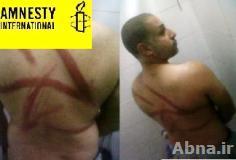
Amnesty International (AI) has condemned the imprisonment of Shia activists in Bahrain, describing the move as “appalling”.
Amnesty Condemns Bahrain Authorities for Arrest and Torture of 50 Shia Activists in Prison
(Ahlul Bayt News Agency) - Allegations that the Bahraini authorities used electric shocks and other torture methods to extract confessions from members of a group of 50 Shi’a activists are just one factor making their trial and convictions unfair, Amnesty International said today.
A Bahraini court sentenced the 49 men and one woman - several in their absence - to up to 15 years’ imprisonment yesterday on charges related to their involvement in the opposition youth movement known as the “14 February Coalition”. The predominantly Sunni Bahraini authorities have accused the Shi’a group of terrorism.
The torture allegations have not been investigated and were not considered by the court, and the trial proceedings in the case fell far short of international standards. One of the defendants, ‘Abd ‘Ali Khair, was sentenced to ten years’ imprisonment just for forwarding an email containing a statement by the 14 February Coalition. His is a member of Al-Wefaq, a political association which does not condone the use of violence in any form.
The 50 are appealing against the verdicts.
Amnesty International Middle East and North Africa Director Philip Luther said
“It’s appalling what passes for ‘justice’ today in Bahrain.
“The authorities simply slap the label ‘terrorist’ on defendants and then subject them to all manner of violations to end up with a ‘confession’.
“The allegations that confessions were extracted under torture must be investigated promptly, thoroughly and independently, with those responsible brought to justice.
“In a cruel irony, the same day dozens of activists were handed down hefty prison sentences for as little as forwarding an email, Bahrain’s High Criminal Court of Appeal reduced the sentences of two policemen to two years each for torturing a protester to death.
“The Bahraini authorities must either release the Shi’a activists or ensure that their appeal trials exclude the admission of evidence extracted under torture and fully conform to international fair trial standards.”
Torture allegations:
Naji Fateel, a board member of the Bahrain Youth Society for Human Rights, was arrested on 2 May at his house in Bani-Jamra. He was held incommunicado for two days. He alleges the authorities used electric shocks on sensitive parts of his body, kicked and punched him, and threatened him with rape. During the first session of the trial on 11 July, Fateel took off his shirt in court to reveal evidence of torture on his back. He was convicted of setting up an illegal “terrorist” group which aims to suspend the constitution and harm national unity, among other things, and sentenced to 15 years in prison.
Rihana al-Mussawi, another defendant, told the court that she had been forced to strip by security officers who threatened her with rape to make her “confess” to terrorism-related crimes. She received a five-year prison sentence.
Mohammad ‘Abdallah al-Singace was also allegedly tortured in detention and, as a result, he could hardly walk when he appeared before the court. His brother Dr ‘Abdeljalil al-Singace is a prisoner of conscience who is currently serving a life sentence in a Bahraini prison. Mohammad ‘Abdallah al-Singace was convicted of membership of an illegal “terrorist” group, among other charges, and sentenced to five years’ imprisonment.
Legal rights denied:
Defendants were arrested without warrants. Some were violently removed from their homes after the security forces reportedly smashed down their front doors. Lawyers complained to the court that they were not allowed to visit their clients. The court refused to allow defence lawyers to bring in witnesses, and even some prosecution witnesses were reportedly not heard. Some defendants, who were already serving prison sentences or were being held pending investigation in other cases, were brought before the court unaware that they faced new charges. They did not have lawyers present at this trial.
source : abna













